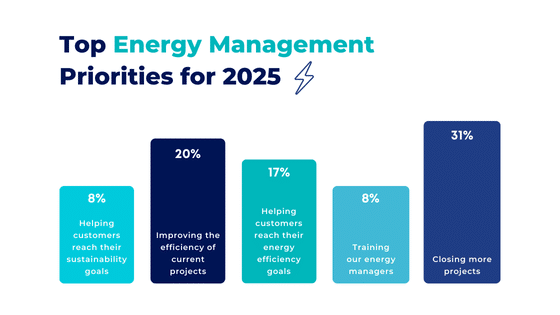As the world grapples with the urgency of achieving sustainability, the energy sector is at the heart of this transformation. Professionals and organizations are exploring innovative strategies and technologies to meet growing efficiency demands and align with global goals. Through the Spacewell Energy Survey 2024, we’ve gained unique insights into the priorities and challenges shaping the future. Coupled with broader industry research, these findings point at key trends poised to redefine energy management in 2025.

The Global Energy Transition
A critical backdrop to these trends is the global energy transition — a collective effort to decarbonize the energy sector and achieve long-term sustainability. This transition encompasses a shift from centralized, fossil-fuel-reliant systems to decentralized, renewable-based models that prioritize efficiency. This transformation is reshaping priorities in the energy sector, as reflected in IEA’S 2024 Outlook.
Elevating Energy Project Success
The drive to close more energy projects remains the industry’s primary focus, with over 30% of the surveyed professionals identifying it as their top priority. But winning new contracts is no longer enough. Clients now demand measurable, transparent outcomes that demonstrate clear value. As professionals refine their processes, project optimization is taking center stage.

A Shift Toward Smarter Technologies
Technology remains a cornerstone of energy management innovation. Solutions for energy control and optimization — a priority for 22% of survey respondents — are becoming indispensable. The ability to fine-tune energy usage through data analytics and intelligent automation allows organizations to reduce waste, cut costs, and meet evolving regulatory demands.
Beyond optimization, the integration of IoT and Big Data is transforming the way energy professionals approach their work. Smart devices and interconnected systems are enabling real-time monitoring, predictive maintenance, and more agile responses to demand fluctuations. These tools are no longer just experimental; they’re essential for staying competitive in the energy sector.
Renewables and Localized Solutions Lead the Way
The transition to renewables has been a focal point for years, and 2025 will see continued advancements in this area. Solar energy, and to a lesser extent, wind, and other on-site renewable solutions, are helping organizations take control of their energy production and reduce reliance on traditional grids.
However, challenges like scalability and integration persist, leaving room for innovation and collaboration. Localized solutions, such as energy communities, are also gaining traction. By pooling resources and distributing energy at a community level, these models offer a sustainable and efficient way forward, according to IRENA’s reports.
Energy Independence with On-Site Renewables
The trend towards on-site renewables is gaining momentum. Organizations are seeking to become more independent from the grid by harnessing their own renewable energy sources, such as solar panels and wind turbines. This trend not only helps reduce dependence on external energy suppliers but also provides the opportunity to achieve partial self-sufficiency.
With advances in technology and declining costs of installation, on-site renewables are becoming a feasible option for more companies, enabling them to lower energy costs, boost sustainability, and enhance energy security. As this trend continues to grow, it will play a crucial role in reshaping how businesses approach energy consumption and sustainability in the years ahead.
Unlocking the Potential of AI
Artificial intelligence is at the tipping point of widespread adoption in energy management. While some skepticism remains, its potential to revolutionize the industry is undeniable. AI-driven tools can analyze massive datasets, identify patterns, and make recommendations faster and more accurately than traditional methods.
At Spacewell Energy, we’ve harnessed this potential through our Forecast tool, which will enable precise energy predictions and enhanced decision-making. AI’s role in streamlining energy operations and uncovering hidden opportunities will only grow as more professionals embrace its capabilities.
Energy Storage and Flexibility as Game-Changers
Energy storage solutions, particularly batteries, are evolving beyond their traditional roles. There’s still some work needed to increase their capacity, but we’re seeing promising new developments. They’re now key to stabilizing grids, integrating renewables, and enabling greater energy independence, according to Bloomberg Energy Outlook. Similarly, demand flexibility is helping organizations adapt to fluctuating grid conditions, ensuring efficiency and reliability even during peak usage periods.
These technologies represent a shift toward a more resilient and adaptive energy model. However, their widespread adoption will require continued investment and innovation — a challenge that the industry is already beginning to tackle.
Shaping the Future with Data and Insights
At Spacewell Energy, we believe that staying ahead in the energy sector requires a blend of innovation, insight, and action. By conducting regular research like our Energy Survey, we aim to equip professionals with the knowledge they need to thrive in a rapidly changing environment.
Our survey findings, paired with industry-wide trends, provide a roadmap for navigating 2025. From smarter technologies to customer-centric approaches, the future of energy management is full of opportunity. The report offers a comprehensive look into the future of energy management, providing essential insights for organizations determined to stay ahead. Download the Spacewell Energy 2024 report today..











